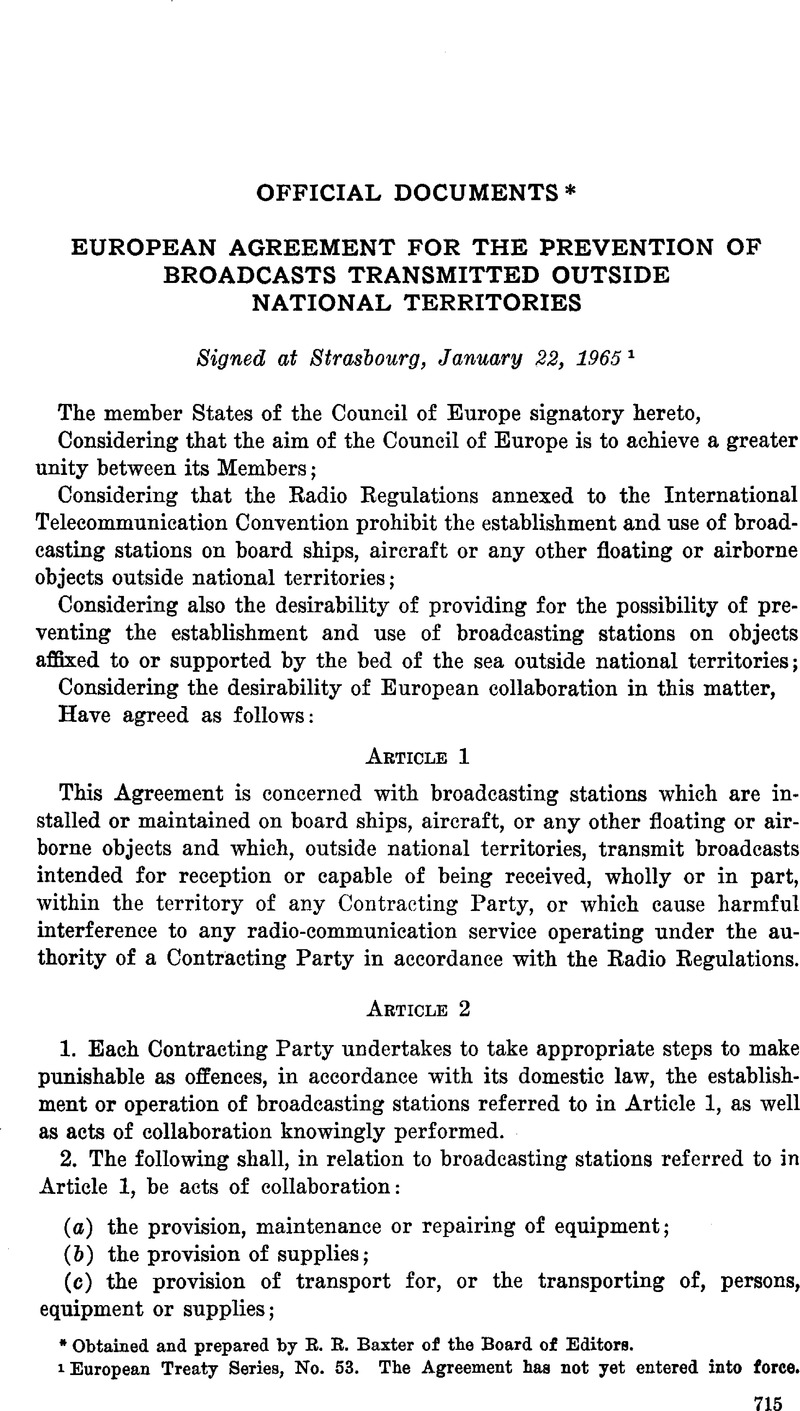No CrossRef data available.
Article contents
European Agreement for the Prevention of Broadcasts Transmitted Outside National Territories
Published online by Cambridge University Press: 28 March 2017
Abstract

- Type
- Official Documents
- Information
- Copyright
- Copyright © American Society of International Law 1965
References
1 European Treaty Series, No. 53. The Agreement has not yet entered into force.
2 Signatures omitted. The Agreement was signed on Jan. 22, 1965, on behalf of Belgium, Denmark, France, Greece, Luxembourg, Sweden, and the United Kingdom, all with a reservation in respect of ratification or acceptance in accordance with paragraph 1(6) of Art. 8. Italy signed the Convention on Feb. 17, 1965, Norway on March 3 and Ireland on March 9, 1965. The United Kingdom submitted the following declaration relating to the interpretation of Article 2 of the Convention: ” I n proceeding to the signature of the European Agreement for the Prevention of Broadcasts Transmitted from Stations outside National Territories on behalf of the Government of the United Kingdom of Great Britain and Northern Ireland, I hereby declare that the United Kingdom Government understands that the references to ‘ broadcasting stations’ in Article 2 are references not merely to the broadcasting apparatus, but also to the ship, aircraft or other ‘base’ on which the station is established, and that 2.2 (a), (b) and (c) are to be taken to refer to the provision of equipment, supplies and transport to the ‘broadcasting stations’ in this sense. The United Kingdom Government therefore wishes to make clear as regards 2.2 (b) that it is its intention so far as is practicable to direct its legislation at supplies in bulk, as for example, diesel oil and not at sales of goods which would not be material to the continued operation of the ‘broadcasting stations’ in the sense referred to above. For example, it is not its intention to make it an offence to sell a packet of cigarettes on shore to a person known to be a member of the crew of a ship which was illegally broadcasting. Similarly with regard to 2.2 (c) it would be intended to direct United Kingdom legislation at transport of persons, equipment or supplies between land and the ‘broadcasting stations’ as understood above.“ The Consultative Assembly of the Council of Europe recommended at its Sixteenth Ordinary Session that the Committee of Ministers instruct … the Committee of Experts on Broadcasting and Television to examine the possibility of supplementing the Agreement by way of a protocol in order: (a) to express the intention of the signatory Powers to use the Agreement exclusively to cope with the limited availability of frequencies and spectrum space, and not to safeguard the vested interests of any State or other monopolies in mass telecommunications; and (b) to extend the provisions of the Agreement to the establishment or operation of broadcasting stations installed on objects affixed to or supported by the sea-bed outside territorial waters or, in the alternative, to prepare a separate convention for the prevention of broadcasts from such stations. (Recommendation 422 (1965), Jan. 29, 1965.)
The United Kingdom submitted the following declaration relating to the interpretation of Article 2 of the Convention:
“ I n proceeding to the signature of the European Agreement for the Prevention of Broadcasts Transmitted from Stations outside National Territories on behalf of the Government of the United Kingdom of Great Britain and Northern Ireland, I hereby declare that the United Kingdom Government understands that the references to ' broadcasting stations' in Article 2 are references not merely to the broadcasting apparatus, but also to the ship, aircraft or other 'base' on which the station is established, and that 2.2 (a), (b) and (c) are to be taken to refer to the provision of equipment, supplies and transport to the 'broadcasting stations' in this sense. The United Kingdom Government therefore wishes to make clear as regards 2.2 (b) that it is its intention so far as is practicable to direct its legislation at supplies in bulk, as for example, diesel oil and not at sales of goods which would not be material to the continued operation of the 'broadcasting stations' in the sense referred to above. For example, it is not its intention to make it an offence to sell a packet of cigarettes on shore to a person known to be a member of the crew of a ship which was illegally broadcasting. Similarly with regard to 2.2 (c) it would be intended to direct United Kingdom legislation at transport of persons, equipment or supplies between land and the 'broadcasting stations' as understood above."
The Consultative Assembly of the Council of Europe recommended at its Sixteenth Ordinary Session that the Committee of Ministers instruct. . . the Committee of Experts on Broadcasting and Television to examine the possibility of supplementing the Agreement by way of a protocol in order:
(a) to express the intention of the signatory Powers to use the Agreement exclusively to cope with the limited availability of frequencies and spectrum space, and not to safeguard the vested interests of any State or other monopolies in mass telecommunications; and
(6) to extend the provisions of the Agreement to the establishment or operation of broadcasting stations installed on objects affixed to or supported by the sea-bed outside territorial waters or, in the alternative, to prepare a separate convention for the prevention of broadcasts from such stations.




